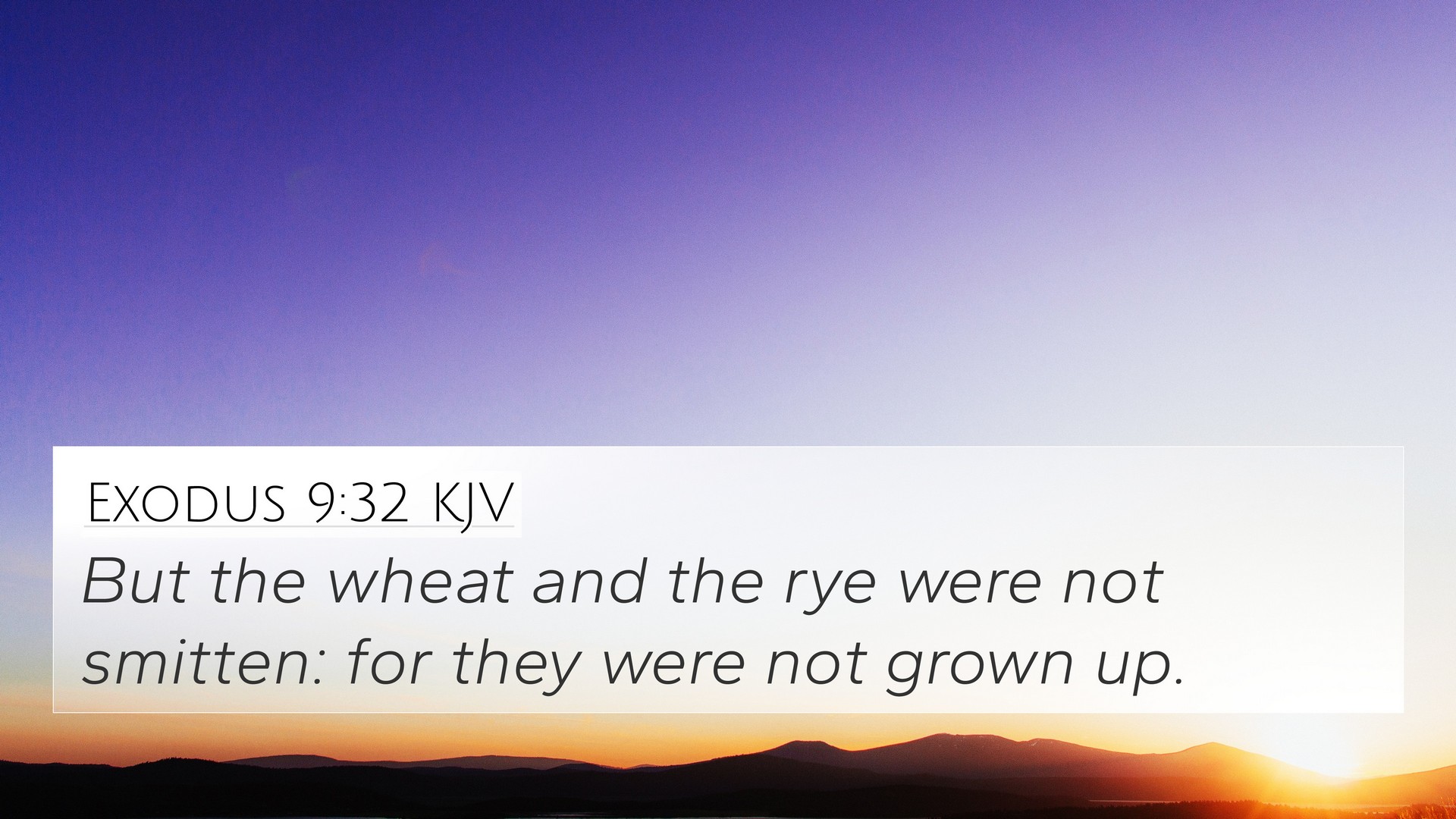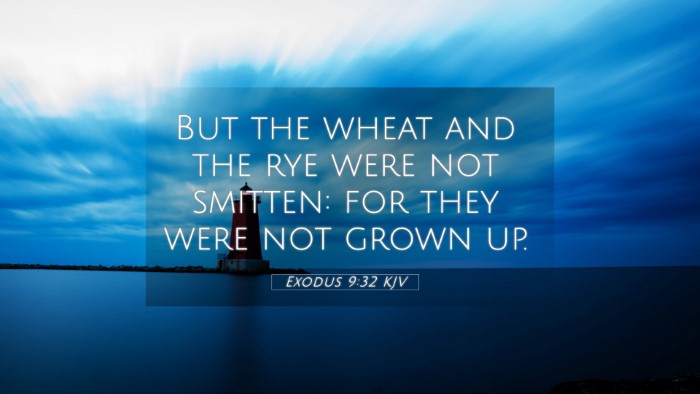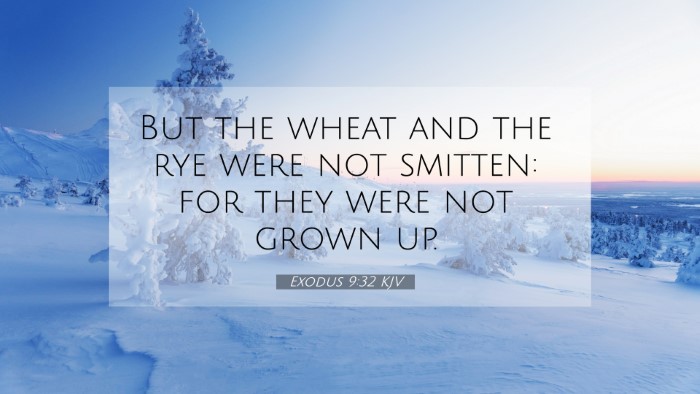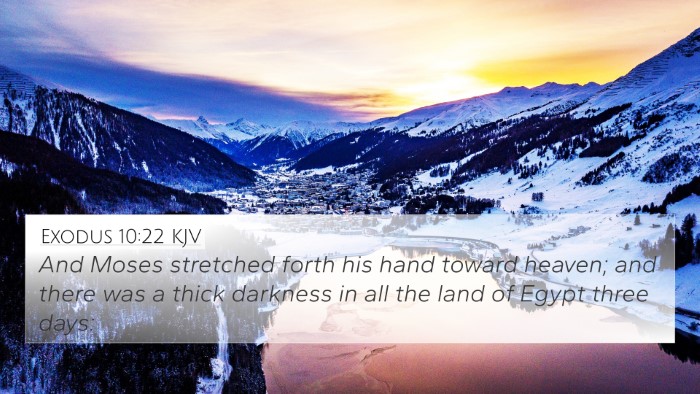Exodus 9:32 - Understanding the Verse
Exodus 9:32 states: "But the wheat and the rye were not smitten: for they were not grown up." This verse occurs in the context of the seventh plague of Egypt, which involves hail that devastates the crops of the land. Here, the verse underscores God's sovereignty and mercy even amidst judgment.
Verse Context and Significance
This verse highlights the selective nature of God's judgments. While the plague inflicted severe damage on various crops, it spared the wheat and rye, which had not yet sprouted. The significance here can be distilled into several themes:
- Divine Control: The control that God exerts over nature is eminent here. Recognizing His ability to direct the plagues to affect only certain areas or crops implies a purposeful act of divine judgment.
- Mercy within Judgment: God's decision to spare the wheat and rye illustrates mercy even in the midst of judgment. This contrasts harsh suffering with hope for future harvests.
- Foreshadowing: This selective judgment can be seen as a foreshadowing of the preservation of the faithful even amid divine wrath.
Commentary Insights
Insights from various public domain commentators provide a deeper understanding of the implications of this verse:
Matthew Henry's Commentary
Matthew Henry notes that the distinction between the crops serves to remind the Israelites of God’s protection over His people even as He brings judgment on Egypt. Henry elaborates on how God, while punishing the Egyptians, intends to keep a remnant of crops safe for sustenance, showcasing both judgment and mercy.
Albert Barnes' Notes
Albert Barnes emphasizes the agricultural context surrounding this verse. He states that at different growth stages, crops endure varying degrees of damage. The wheat, needing maturity to be damaged, remained untouched, indicating a divine plan to allow for future growth and prosperity for the Israelites, while bringing ruin to Egypt's reliance on its crops.
Adam Clarke's Commentary
Adam Clarke points out the implication of the spared crops as a divine assurance to the Israelites. Clarke interprets the sparing of the wheat as a promise of future blessings and as an emblem of the sustenance God promises His people.
Bible Cross-References
This verse resonates with several others throughout the Bible that speak on God's judgment, mercy, and the protection of His people:
- Genesis 12:3: "And I will bless them that bless thee, and curse him that curseth thee..." - God’s covenant support is evident in His dealings with nations.
- Exodus 10:4: "Else, if thou refuse to let my people go, behold, to morrow will I bring the locusts into thy coast..." - The consistency of God’s warnings highlights his just nature.
- Psalms 91:7: "A thousand shall fall at thy side, and ten thousand at thy right hand; but it shall not come nigh thee." - This assures believers of God’s divine protection.
- Romans 9:15: "For he saith to Moses, I will have mercy on whom I will have mercy..." - Mercy is sovereignly given, echoing God's selective action in Exodus.
- Isaiah 54:9: "For this is as the waters of Noah unto me: for as I have sworn that the waters of Noah should no more go over the earth; so have I sworn that I would not be wroth with thee..." - Displays God’s promise not to destroy the earth again as a representation of mercy.
- Revelation 7:3: "Hurt not the earth, neither the sea, nor the trees, till we have sealed the servants of our God in their foreheads." - Relates to protection amidst judgment.
- 2 Corinthians 1:10: "Who delivered us from so great a death, and doth deliver: in whom we trust that he will yet deliver us;" - Trust in God's continued grace and protection strengthens faith.
Thematic Connections
The themes emerging from Exodus 9:32 connect with various biblical motifs, enriching our understanding of divine interaction:
- Judgment vs. Mercy: God's judgment seen in Exodus connects with themes of divine mercy throughout the Bible, showing that He can bring punishment while also providing a means for salvation.
- Harvest and Provision: This verse reflects on agricultural metaphors that run throughout scripture, portraying God as the ultimate provider of physical and spiritual nourishment.
- God’s Promises: The preservation of the wheat points to God’s unchanging nature in fulfilling His promises of provision and mercy.
Cross-Referencing Tools
Utilizing tools for cross-referencing, such as a Bible concordance or Bible cross-reference guide, enhances your ability to study and understand themes throughout scripture effectively. These resources facilitate:
- Identifying connections between Old and New Testament passages.
- Creating comprehensive thematic studies linking various scriptures.
- Engaging in Bible cross-reference study methods to explore inter-Biblical dialogue and scriptural parallels.
User Intent and Cross-Referencing
As individuals delve into the meanings of Bible verses and seek answers to questions such as "What verses are related to Exodus 9:32?", they can utilize various methods for effective exploration:
- How to find cross-references in the Bible involves using topical or thematic exploration through scripture.
- Identifying the connections and similarities between related verses showcases the intricate web of God's message.
In summation, Exodus 9:32 serves not only as a narrative detail of the plagues but also a profound illustration of divine sovereignty, mercy, and provision within the context of judgment. Engaging with this verse through commentary insights and scriptural cross-referencing allows for a richer understanding of the text and its application in the broader biblical narrative.



